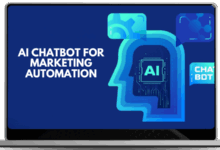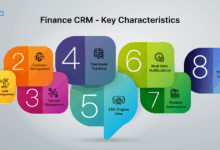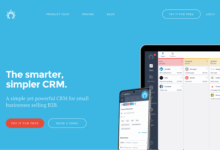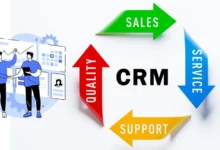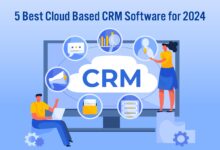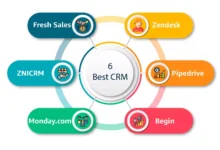AI-Powered CRM Software: Revolutionizing Customer Relations
AI-Powered CRM Software is transforming how businesses manage customer relationships. No longer are CRM systems simply databases; they are now intelligent platforms leveraging machine learning, predictive analytics, and natural language processing to automate tasks, personalize interactions, and drive significant business growth. This exploration delves into the core functionalities, benefits, implementation, and future trends of this powerful technology, showcasing its impact across diverse industries.
This examination will cover the key differences between traditional and AI-powered CRMs, highlighting the advantages of AI-driven features such as predictive lead scoring, automated chatbot responses, and insightful sales forecasting. We will also analyze successful real-world implementations, address integration challenges, and offer a glimpse into the future of AI in CRM.
Defining AI-Powered CRM Software
AI-powered CRM software represents a significant evolution in customer relationship management, leveraging artificial intelligence to automate tasks, analyze data, and ultimately improve business outcomes. It moves beyond the basic functionalities of traditional CRM systems by incorporating machine learning and other AI capabilities to provide more insightful and actionable information.
AI-powered CRM software goes beyond simple data storage and retrieval. It actively uses data to predict future behavior, personalize customer interactions, and streamline sales and marketing processes. This results in increased efficiency, improved customer satisfaction, and ultimately, higher revenue generation.
Core Functionalities of AI-Powered CRM Software
AI-powered CRM systems offer a range of functionalities built upon the foundation of traditional CRM, but enhanced significantly by AI capabilities. These functionalities are designed to automate repetitive tasks, provide predictive insights, and personalize customer interactions, leading to increased efficiency and improved customer relationships. Key functionalities include lead scoring and prioritization, automated workflows, predictive analytics for sales forecasting and customer churn prediction, personalized recommendations, and proactive customer service through chatbots and virtual assistants.
Key Differences Between Traditional CRM and AI-Powered CRM
The primary difference lies in the use of artificial intelligence. Traditional CRM systems primarily focus on data organization, storage, and retrieval. They offer basic functionalities like contact management, sales pipeline tracking, and reporting. AI-powered CRM, however, uses algorithms to analyze this data, identify patterns, and make predictions. This allows for proactive, rather than reactive, engagement with customers. For example, a traditional CRM might track customer interactions, while an AI-powered CRM would analyze those interactions to predict future behavior and tailor marketing campaigns accordingly. Traditional CRMs require manual intervention for most tasks, while AI-powered systems automate many processes, freeing up human resources for more strategic activities.
Examples of AI Features Integrated into CRM Systems
Several AI features significantly enhance the capabilities of CRM systems. Predictive analytics, for instance, uses historical data to forecast future trends, such as sales revenue or customer churn. This allows businesses to proactively address potential issues and optimize their strategies. Lead scoring uses AI algorithms to assign scores to leads based on their likelihood of conversion, allowing sales teams to prioritize their efforts on the most promising prospects. Chatbots provide instant customer support, answering common questions and resolving simple issues, freeing up human agents to handle more complex inquiries. These are just a few examples; AI capabilities are constantly evolving and expanding within CRM systems.
Comparison of Three Leading AI-Powered CRM Solutions
| Feature | Salesforce Einstein | Microsoft Dynamics 365 AI | HubSpot CRM with AI |
|---|---|---|---|
| Predictive Analytics | Strong; offers various predictive models for sales, marketing, and service. | Strong; integrates with Power BI for advanced analytics. | Good; provides basic predictive lead scoring and churn prediction. |
| Lead Scoring | Highly customizable and sophisticated scoring models. | Robust lead scoring with integration to marketing automation. | User-friendly interface, but less sophisticated models compared to Salesforce or Dynamics. |
| Chatbots | Integrates with various chatbot platforms for seamless customer service. | Offers built-in chatbot capabilities, but customization may be limited. | Provides basic chatbot functionalities, easily integrated with other HubSpot tools. |
| Integration Capabilities | Extensive integration with other Salesforce products and third-party apps. | Seamless integration with other Microsoft products and a wide range of third-party tools. | Strong integration within the HubSpot ecosystem, but fewer third-party integrations compared to Salesforce or Dynamics. |
| Pricing | Wide range of pricing tiers, can be expensive for smaller businesses. | Similar pricing structure to Salesforce, offering various plans to suit different needs. | Generally more affordable than Salesforce and Dynamics, particularly for smaller businesses. |
Benefits and Use Cases
AI-powered CRM software offers a significant leap forward in managing customer relationships, moving beyond basic contact management to proactive, data-driven engagement. By leveraging artificial intelligence, businesses can streamline operations, improve customer satisfaction, and ultimately drive revenue growth. This section will explore the key benefits and diverse applications of this transformative technology.
Implementing AI-powered CRM software delivers substantial business advantages. The core benefit lies in the automation of repetitive tasks, freeing up valuable employee time for more strategic activities like building stronger customer relationships and developing targeted marketing campaigns. This increased efficiency translates directly into cost savings and improved productivity. Moreover, AI enhances decision-making by providing insightful data analysis, leading to more effective strategies and improved business outcomes.
Enhanced Customer Relationship Management through AI
AI significantly enhances CRM by automating various processes, personalizing customer interactions, and providing predictive analytics. Automation handles tasks such as lead scoring, email marketing, and appointment scheduling, allowing sales and marketing teams to focus on higher-value activities. Personalization is achieved through AI-powered recommendation engines that suggest products or services based on individual customer preferences and past behavior. Predictive analytics, using machine learning algorithms, forecast customer churn, identify high-potential leads, and optimize sales strategies for maximum impact.
Real-World Examples of Successful AI-Powered CRM Implementations
Several businesses have successfully integrated AI into their CRM systems. For example, a large e-commerce company uses AI to personalize product recommendations on its website, leading to a significant increase in conversion rates. Another example is a financial institution that employs AI-powered chatbots to handle customer inquiries, improving response times and reducing customer service costs. A marketing agency leverages AI to segment its customer base, enabling targeted marketing campaigns with improved ROI.
Industries Benefiting Most from AI-Powered CRM
Industries with large customer bases and complex sales cycles benefit most from AI-powered CRM. This includes sectors such as financial services, healthcare, and e-commerce. In financial services, AI helps with fraud detection and risk management, while in healthcare, it aids in patient engagement and personalized treatment plans. E-commerce businesses use AI for personalized recommendations, targeted advertising, and improved customer service.
Use Cases of AI-Powered CRM
The versatility of AI-powered CRM is demonstrated in a wide range of use cases. AI can automate lead qualification and scoring, prioritizing high-potential leads for sales teams. It can personalize customer communications through targeted email campaigns and chatbots, improving customer engagement and satisfaction. AI-powered predictive analytics can forecast customer churn, allowing businesses to proactively address potential issues and retain customers. Sales forecasting and pipeline management are also significantly enhanced through AI-driven insights. Finally, AI facilitates improved customer service by automating responses to frequently asked questions and providing personalized support.
AI Features and Capabilities
AI-powered CRMs leverage several sophisticated technologies to revolutionize customer relationship management. These features significantly enhance efficiency, personalize interactions, and ultimately drive business growth. The core technologies powering these advancements include machine learning, natural language processing, predictive analytics, and AI-powered chatbots.
Machine Learning in CRM Process Improvement
Machine learning algorithms analyze vast amounts of CRM data – customer interactions, purchase history, demographics, and more – to identify patterns and trends. This allows for automated tasks such as lead scoring, segmenting customers based on behavior, and predicting customer churn. For instance, a machine learning model might identify that customers who haven’t logged in for three months and haven’t engaged with marketing emails are at high risk of churning, prompting proactive interventions by the sales team. This proactive approach improves customer retention and reduces loss of revenue.
Natural Language Processing (NLP) in AI-Powered CRM
Natural Language Processing enables AI-powered CRMs to understand and interpret human language. This allows for features such as automated email responses, sentiment analysis of customer feedback, and intelligent search capabilities within the CRM system. For example, NLP can analyze customer reviews to identify areas for product improvement or detect negative sentiment, allowing for timely intervention and improved customer satisfaction. It also enables the CRM to automatically categorize and route incoming emails based on their content, freeing up human agents to focus on more complex issues.
Predictive Analytics in Lead Generation and Sales Forecasting
Predictive analytics uses historical data and machine learning algorithms to forecast future outcomes. In CRM, this means predicting which leads are most likely to convert into customers, forecasting sales revenue, and optimizing marketing campaigns. For instance, a predictive model might identify that leads from a specific geographic region or with certain demographics are more likely to purchase a particular product, allowing sales teams to prioritize their efforts and improve conversion rates. Similarly, sales forecasting helps businesses plan resources more effectively and make informed business decisions. A company might use predictive analytics to forecast a 15% increase in sales for Q4 based on historical data and current market trends, allowing them to adjust inventory and staffing accordingly.
AI-Powered Chatbots for Enhanced Customer Service and Support
AI-powered chatbots provide instant, 24/7 customer support. These chatbots can answer frequently asked questions, resolve simple issues, and escalate complex problems to human agents. This improves customer satisfaction by providing quick responses and reducing wait times. For example, a chatbot can assist customers with order tracking, password resets, and basic product information, freeing up human customer service representatives to handle more complex inquiries requiring human intervention. This results in improved efficiency and reduced operational costs.
AI Improvements to Sales Team Efficiency
AI enhances sales team efficiency in various ways. Lead scoring prioritizes leads based on their likelihood to convert, allowing sales representatives to focus on the most promising prospects. Automated tasks, such as data entry and follow-up emails, free up time for sales representatives to focus on building relationships and closing deals. Sales insights and recommendations, generated by AI, enable sales teams to personalize their interactions and improve their sales strategies. For example, an AI system might suggest personalized email templates based on a lead’s industry and previous interactions, increasing the effectiveness of outreach efforts. This leads to improved conversion rates and increased revenue.
Implementation and Integration
Implementing AI-powered CRM software requires a strategic approach encompassing careful planning, efficient execution, and ongoing monitoring. Success hinges on a thorough understanding of your business needs, the capabilities of the chosen software, and the existing IT infrastructure. A phased rollout often proves more effective than a complete, immediate overhaul.
Step-by-Step Guide for Implementing AI-Powered CRM Software
A successful implementation follows a structured process. This involves defining clear objectives, selecting the right software, preparing your data, configuring the system, training your team, and continuously monitoring performance.
- Needs Assessment and Goal Definition: Clearly articulate your business goals and how the AI-powered CRM will contribute to achieving them. This includes identifying key performance indicators (KPIs) to track progress.
- Software Selection and Vendor Evaluation: Evaluate different AI-powered CRM solutions based on features, scalability, integration capabilities, and vendor support. Consider factors like cost, implementation timeline, and ongoing maintenance.
- Data Preparation and Migration: Cleanse and prepare your existing customer data for migration. This includes addressing data inconsistencies, duplicates, and incomplete information. A well-defined data migration plan is crucial to minimize disruption.
- System Configuration and Customization: Configure the CRM system to match your specific business processes and workflows. This may involve customizing fields, reports, and dashboards.
- User Training and Adoption: Provide comprehensive training to your sales and customer service teams on how to effectively use the new system. This includes hands-on training and ongoing support.
- Integration with Existing Systems: Integrate the AI-powered CRM with other critical business systems, such as marketing automation, email marketing platforms, and accounting software. This ensures data consistency and streamlined workflows.
- Testing and Go-Live: Thoroughly test the system before going live to identify and resolve any issues. A phased rollout to different departments can minimize risk.
- Ongoing Monitoring and Optimization: Continuously monitor system performance and user adoption. Make adjustments and optimizations as needed to maximize the ROI of the investment.
Challenges of Integrating AI-Powered CRM with Existing Systems
Integrating AI-powered CRM with legacy systems can present significant hurdles. Data format inconsistencies, incompatible APIs, and the need for extensive customization are common challenges. Moreover, ensuring seamless data flow and maintaining data integrity across multiple systems requires careful planning and execution. For example, integrating with a very old, poorly documented system might require significant custom development work and extensive testing.
Best Practices for Data Migration and System Integration
Successful data migration and system integration require a well-defined strategy. This includes data cleansing, transformation, and validation to ensure data accuracy and consistency. Employing a phased approach, using robust ETL (Extract, Transform, Load) tools, and establishing clear data governance policies are essential best practices. Regular backups and thorough testing are crucial to mitigate risks.
Data Security and Privacy in AI-Powered CRM
Data security and privacy are paramount in AI-powered CRM. Robust security measures, such as encryption, access controls, and regular security audits, are essential to protect sensitive customer data. Compliance with relevant data privacy regulations, such as GDPR and CCPA, is crucial. Implementing data anonymization techniques can help minimize privacy risks while still enabling valuable data analysis.
Checklist for Choosing an AI-Powered CRM Solution
Selecting the right AI-powered CRM requires careful consideration of various factors. This checklist provides a framework for a thorough evaluation:
- Functionality and Features: Does the software offer the AI capabilities needed to meet your business objectives? Consider features such as lead scoring, predictive analytics, and automated workflows.
- Integration Capabilities: Can the software seamlessly integrate with your existing systems? Assess its API capabilities and compatibility with other essential business tools.
- Scalability and Performance: Can the software handle your current and future data volume and user needs? Consider factors like processing speed, storage capacity, and system uptime.
- Security and Privacy: Does the software comply with relevant data privacy regulations? Evaluate its security features, such as encryption, access controls, and data backup mechanisms.
- Vendor Support and Training: Does the vendor offer comprehensive support and training? Consider factors like response time, documentation, and ongoing maintenance services.
- Cost and ROI: Evaluate the total cost of ownership, including licensing fees, implementation costs, and ongoing maintenance. Assess the potential return on investment based on anticipated improvements in sales, customer service, and operational efficiency.
Future Trends and Developments
The landscape of AI-powered CRM is constantly evolving, driven by advancements in machine learning, natural language processing, and big data analytics. These advancements are reshaping how businesses interact with their customers, leading to more personalized, efficient, and proactive engagement. Understanding these emerging trends is crucial for businesses seeking to leverage the full potential of AI in CRM.
Emerging trends in AI-powered CRM are characterized by increased sophistication in predictive analytics, hyper-personalization, and seamless integration across various business functions. The integration of AI is no longer a niche feature; it’s becoming a fundamental component of successful CRM strategies. This shift is driven by the need for businesses to stay competitive in a market where customer experience is paramount.
Predictive Analytics and Proactive Customer Engagement
AI is rapidly enhancing predictive capabilities within CRM systems. By analyzing vast amounts of customer data, AI algorithms can predict customer churn, identify high-value prospects, and anticipate future needs. This allows businesses to proactively address potential issues, personalize offers, and improve customer retention. For example, an e-commerce platform might use AI to predict which customers are likely to abandon their shopping carts and send them targeted discount codes or reminders. This proactive approach leads to improved conversion rates and increased revenue.
Hyper-Personalization and Enhanced Customer Experiences
AI empowers businesses to deliver truly personalized experiences at scale. By analyzing customer data points such as purchase history, browsing behavior, and social media interactions, AI can tailor marketing messages, product recommendations, and customer service interactions to individual preferences. This level of personalization fosters stronger customer relationships and drives loyalty. Consider a streaming service that uses AI to recommend movies and shows based on a user’s viewing history and preferences, resulting in higher engagement and subscriber retention.
The Rise of Conversational AI and Automated Customer Service
Chatbots and virtual assistants powered by natural language processing (NLP) are transforming customer service. These AI-driven tools can handle routine inquiries, provide instant support, and escalate complex issues to human agents efficiently. This automation frees up human agents to focus on more intricate tasks, leading to improved customer satisfaction and reduced operational costs. Many banks, for instance, now utilize AI-powered chatbots to answer frequently asked questions about account balances and transactions, providing 24/7 support.
AI-Driven CRM in the Next Five Years: Predictions
Within the next five years, we can expect even greater integration of AI across all aspects of CRM. This will include more sophisticated predictive models, improved natural language processing capabilities, and wider adoption of automation in sales, marketing, and customer service. We anticipate seeing a rise in AI-powered tools that facilitate hyper-personalization at an unprecedented level, further blurring the lines between online and offline customer interactions. Furthermore, the ethical considerations surrounding AI in CRM, such as data privacy and algorithmic bias, will become increasingly important and will drive the development of more responsible and transparent AI systems.
Conceptual Illustration of a Future AI-Powered CRM Interface
Imagine a CRM interface that dynamically adapts to the user’s needs and context. The main dashboard presents a visually engaging summary of key performance indicators (KPIs) such as customer churn rate, sales conversion rates, and customer satisfaction scores. Interactive data visualizations allow for easy exploration of customer data, revealing trends and patterns. A central section displays a prioritized list of customer interactions, with each customer profile containing a comprehensive summary of their history, preferences, and predicted future behavior. AI-powered suggestions for personalized actions, such as targeted marketing campaigns or proactive customer service interventions, are prominently displayed. The interface integrates seamlessly with other business systems, such as marketing automation platforms and e-commerce websites, providing a unified view of customer interactions across all channels. The user experience is intuitive and personalized, with voice commands and natural language processing allowing for quick access to information and task completion. The system learns and adapts over time, constantly improving its predictive capabilities and tailoring its interface to individual user preferences. This future-state CRM interface represents a paradigm shift in how businesses manage and interact with their customers, empowering them to build stronger relationships and drive business growth.
Final Summary
AI-powered CRM software represents a significant advancement in customer relationship management, offering businesses unprecedented opportunities to enhance efficiency, personalize interactions, and ultimately boost profitability. By understanding its capabilities, addressing implementation challenges, and embracing emerging trends, organizations can harness the transformative power of AI to cultivate stronger customer relationships and achieve sustainable growth. The future of CRM is undeniably intelligent, and the benefits are clear for those who embrace this innovative technology.
